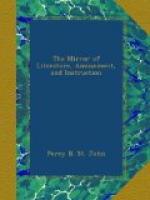of Milbank, near Vauxhall-bridge; and the situation
has much the same character. The river, however,
is grander, as I should judge it to be twice the width
of the Thames at London-bridge, and it flows with
great rapidity. It was a charming evening, and
we saw the sun set in all his glory down the Scheldt,
in the bosom of which were reflected the endless tints
of the sky, whose golden brilliancy was beautifully
relieved by the intervention of some cottages near
us, and a pretty village, with its church-spire a little
further off. On one side was the flat cultivated
country of Flanders, and looking up the river, we
beheld the shipping and the whole city: all the
churches and towers raised their varied forms, but
still only to do homage, as it were, to the great
pile which outstripped them, and which was lit up
by the radiance of the departed sun. Model of
splendour! “from morn ’till dewy eve”
how must thy elegant form be engraven on the hearts
of the natives of the city thou overlookest, exciting
emotions of home, like the craggy rock of the Highlanders,
when they are absent in distant lands! and how must
the youth, whom the love of art carries to study the
treasures of Venice and Rome, when returning to shed
a lustre upon his natal place—of being
one day named with Matsys and Rubens, and the other
splendid painters by whom it has been adorned—how
must the first glance that he catches of thy hallowed
height make his heart throb with endearing thoughts
of the friends he left under thy shade, and absorb
for the moment all feelings of ambition in the recollection
of the boyish days passed within thy ken—but
now, alas, departed for ever! May the fires of
heaven, and the tremblings of earth, never injure
thy venerable beauty; but may thousands, and tens
of thousands, in time to come, as in time past, gaze
upon thee—as I, an obscure, nameless stranger,
have done—with thoughts too deep for words!
During the evening I have alluded to we were accompanied
by the accomplished Miss ——, whose
talents must be well known to many of our own artists
who have visited Antwerp; and this being her native
place, her conversation gave us those kindly associations
of home, without which no scenes, however beautiful
or however uncommon, can penetrate the inmost recesses
of the soul.
W.G.
Our Correspondent, in a few introductory lines, modestly,
though somewhat unnecessarily, apologizes for the
enthusiasm of the reflective portion of the previous
sketch. He will perceive that we have ventured
upon a few slight alterations. He concludes his
note to us with an assurance that “the feelings
were sincere, however trifling the thoughts, or inadequate
the expression.” Of his sincerity we have
no doubt; and where the feelings of a writer are so
honourable to his heart as are many in this paper,
we are not fastidious enough to quarrel with inadvertencies
of the head. All have felt the overpowering effect
produced by the contemplation of the sublimities of
art, but comparatively few are aware of the difficulty
of embodying these first impressions in descriptive
detail.—ED.




